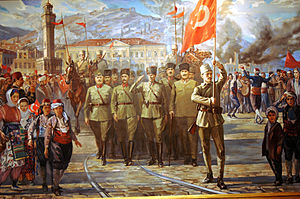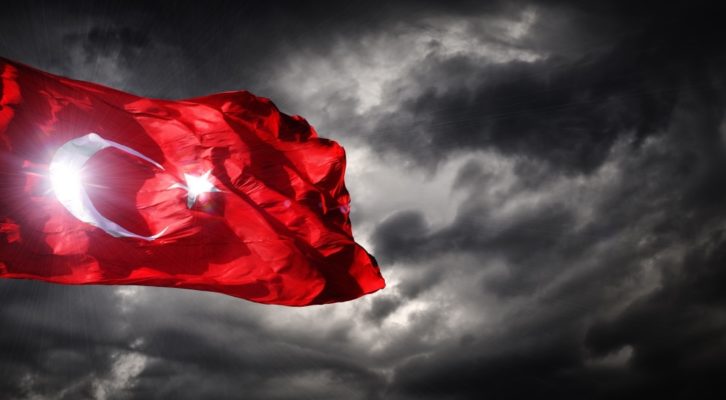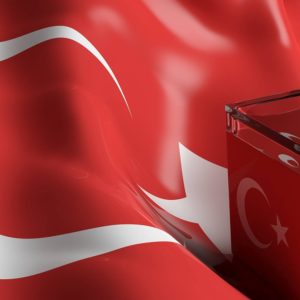Some 51.4 percent of the more than 58 million Turks who turned out to vote on April 16 said yes to the ruling Justice and Development Party’s (AKP) constitutional amendment package. With that vote, they decided to shift to an executive presidential system.
It is debatable if the government would still have won if it had not detained thousands of political dissidents, imposed a state of emergency, and labeled “no voters” as terrorists and traitors. In addition, many irregularities took place before and during the counting. The Supreme Election Board (YSK), for example, controversially announced that it would accept unsealed ballots after it held a meeting following a high number of complaints regarding those unsealed ballot papers.
The main opposition Republican People’s Party (CHP) has said it will object to the referendum results on grounds that the votes for the constitutional amendment were manipulated in terms of content and method. The pro-Kurdish Peoples’ Democratic Party (HDP), which has had two of its leaders imprisoned, has also declared that the result will not be legitimate until an appeal is finalized.
Opponents of the bill in and outside Turkey have repeatedly argued that it would be the “death of the Turkish democracy” – as if Turkey has ever been a true democracy. A democratic legal structure ensures basic human rights and freedoms associated with religion, ethnic identity, political expression and peaceful assembly, among others, for each citizen.
A closer look at Turkey’s history makes it clear that the citizens of Turkey who were born into non-Muslim or non-Turkish families have never fully had those rights and freedoms. For decades, they have been exposed to systematic persecution and even murderous attacks.
The right to vote is undoubtedly critical in democracies, but it is not enough to define a regime as a democracy. Non-Muslims have very rarely been allowed to run as members of parliament in Turkey’s parliament. For example, in the November 7, 2015 national elections, only four Christians became MPs in the 550-member Turkish parliament. But prominent minority rights activist Laki Vingas considered even this development exciting because it was progress, given mainstream Turkish standards of democracy. In 80 years, only 24 non-Muslims have became Turkish MPs in a country that used to be a majority-Christian territory until the 11th-century Turkish conquest.
Today, only 0.2 percent of Turkey’s population is Christian or Jewish. In the absence of non-Muslim minorities, the Turkish government now targets and oppresses other Turks, mainly non-Islamist/secular Turks and Gülenist Muslims – sympathizers of Islamic cleric Fethullah Gülen, a former ally turned arch-enemy of Turkish President Recep Tayyip Erdoğan.
The media is filled with reports about the Turkish government’s targeting, arresting, repressing, dismissing and, in some cases, torturing of ethnic Turks. Recent attacks against Turkish-Muslim citizens of Turkey are actually standard practice by the Turkish government. The difference now is who is on the receiving end.

The entry of the Turkish Army into Izmir. Museum of Ataturk and the War of Independence Museum
But most of the ethnic Turkish citizens still fail to grasp the fact that Turkey’s historical and current crimes against minorities – Greeks,Armenians, Assyrians, Jews, Alevis, Kurds and Yazidis, as well as the silence of much of the Turkish Muslim majority – have created the ever-authoritarian, oppressive and anti-democratic regime of Turkey.
A recent incident in Greece is a striking indication of this phenomenon. Turkish football club Beşiktaş played against Greek club Olympiacos in Athens on March 10. The Turkish fans sang a nationalist anthem called “The Izmir March,” which celebrates the Turkish act of throwing Greeks into the Aegean Sea in 1922. They also shouted the slogan “We are soldiers of Mustafa Kemal.”
Ironically, “The Izmir March” was recorded in 1908 by a Greek orchestra and a Greek production company called Orfeon. It seems that Turkish nationalists turned it into a nationalist, anti-Greek anthem without giving credit to its former recorders, the Greeks.
The lyrics of the anthem are:
Flowers blossom in the mountains of Izmir
The golden sun sparking its rays
Defeated enemies flee like the wind.
I sat and stayed in the mountains of Izmir
Listing martyrs in my diary
Embraced the poor orphans.
Long live Mustafa Kemal Pasha, long live
Your name will be carved on precious stones.
The rest of the poem reads:
They [Turks] placed bombs in the mountains of Izmir
They put the flag of the Turk right at the front
They drowned the enemy in glorious victories
Oh, my poor mom, that was our fate
Let me sacrifice my blood for the beautiful homeland.
The embrace of the prophet [Mohammed] is the place of the martyrs.
The horns have been blown, forward!
The tents have been dismantled, don’t lag behind!
I’m a Turkish son; I’d like to die
Even if the homeland is a thorn, it’s my bed
Those who return should be ashamed of Allah.
Long live Mustafa Kemal Pasha, long live
Your name will be carved on precious stones.
The “Izmir March” refers to Turkish soldiers’ September 1922 march and military operations in the Anatolian city of Smyrna (Izmir). The Turks were led by Mustafa Kemal Ataturk, who one year later established the Turkish republic.
Turkish soldiers burned and plundered Smyrna’s Christian neighborhoods, killing defenseless Greek and Armenian residents. The “lucky” ones were able to flee their homes to seek shelter in Greece and other countries. Then the Turkish soldiers burned down the Greek and Armenian neighborhoods of the city. Tens of thousands of Christians lost their lives; the rest were forcibly deported.
The internationally metropolitan culture of this highly advanced art center of the world was erased from existence. The demographic balance between the city’s Muslims and non-Muslims was completely changed. Thus, Izmir became a Turkish and Muslim city.
In a report addressed to U.S. Secretary of State George Horton, the former U.S. consul general in Smyrna said, “I wish to repeat that the consistent policy of the Turk – since the fall of [Ottoman Sultan] Abdul Hamid – has been the expulsion, killing and elimination of the Christian races.”
But now, 95 years later, why do so many Turks still not show any sign of regret, shame or guilt for these incidents? Here are a few reasons:
- According to common Turkish narratives, the Greeks, Armenians and Assyrians were not victims of Turkish persecution. Instead, the Turks are taught that these people groups were mass murderers, rapists and plunderers. They cooperated with the imperialists to divide and destroy Ottoman Turkey, the fatherland of the Turks. That is why the “oppressed” Turks had to deal with the “troublemakers.” So the Greeks and Armenians finally got what they deserved: extermination.
- The Izmir anthem talks about the march of Turkish soldiers and their own sacrifice, but not what they actually did in Izmir. But the Turks claim that the Greek soldiers burned the city before they fled and drowned in the Aegean Sea. Since the Turks do not acknowledge that their ancestors massacred the local Greek and Armenian population, they are proud of “the march” and the events in Izmir. They focus only on the Turkish fight against Greek soldiers – Armenians – whom the Turks consider to be invaders in the city. Hence, they take great pride in that song and accept it as a normal patriotic anthem without any thought given to the slaughters.
In such a formula, the fact that Greeks, Armenians and Assyrian Christians are the indigenous peoples of Anatolia is of little value. The Turks believe they are the only permanent and dominant rulers of the lands they conquered in the 11th century.
According to Turkish rhetoric (brainwashing, if you will), the victims are perpetrators and the perpetrators are victims. The natives are invaders and the invaders are natives. The oppressed are the oppressors and the oppressors are the oppressed. Left is right and right is left. Everything is turned upside-down.
Professor Taner Akçam wrote a comprehensive article about how the Armenian genocide was taught at Turkish schools in 2015. “Turkish history textbooks are filled with the message that Armenians are incited by foreign sources, want to partition the country, and kill Turks and Muslims,” he said. “They direct their own citizens to view a specific citizen group (Armenians) as the enemy. In addition, they define the ‘Armenian problem’ as the biggest threat to national security and urge Turkish youth to be vigilant against this threat.”
The Turkish history textbooks say that “the law, which authorized the deportation [of Armenians], arose as a product of necessity, but the deportation had another very important role − protecting and saving Armenians. From who, you ask? Other Armenians.”
Sadly, Turkey not only denies the 1915 Christian genocide, it also puts the blame on the victims. The widespread propaganda about history fed to the Turkish people at schools, in the media and elsewhere gives many of them a false sense of supremacy and paves the way for further crimes against other groups like the Kurds and Alevis.
For example, between July 2015 and December 2016, several majority-Kurdish cities in southeastern Turkey were subjected to around-the-clock curfews by the Turkish government. The curfews were accompanied by military assaults against civilian populations; their homes, businesses, offices, historical monuments, reservoirs and infrastructure were bombed and destroyed.
According to a report published in February by the Office of the United Nations High Commissioner for Human Rights,
“In late January and early February 2016 in the town of Cizre, men, women and children trapped in basements of buildings were reportedly subjected to shelling by security forces. Some of the victims trapped in the basements were calling for the attention of the world community through mobile telephone conversations with NGOs and members of parliament, begging to be saved from shelling. The bodies of an undetermined number of people were completely or partially destroyed in fire induced by shelling and the subsequent rushed demolition of the location of the incident. The subsequent demolition of the buildings destroyed evidence and has therefore largely prevented the basic identification and tracing of mortal remains.”
Another report by scientists from the Vaudois University Hospital Center in Switzerland also showed that Kurdish residents who took shelter in the basement of a building in Cizre district during the curfews were killed by gunshots and then burned.
These atrocities and more against Kurds have taken place with the silent approval of much of the Turkish public. Some even celebrated and mocked the shelling and mass murders in Cizre on their social media accounts.
It would not be an overstatement to say that the Turkish official narrative that distorts historical facts and turns the victims into perpetrators and perpetrators into victims destroys the ability of many Turks to establish empathy with people of other ethnic or religious groups. Today, many ethnic Turks are being victimized by their own repressive government. Sadly, the Turks who oppose the Turkish government are now confronted with their own annihilation by their own Turkish brothers and sisters.
Throughout the decades, it was the same atmosphere and the same hatred with public threats and violence, but it was directed at Christians, Jews and Kurds. This was what drove many non-Muslims out of Turkey. It was not possible for non-Muslim or non-Turkish citizens of Turkey to live under constant threat and not knowing where to get any justice because the government was behind the hatred and was directing it. Now it has also turned against ethnic Turks because they are not considered Islamist enough and because they do not support Erdoğan.
Many observers agree that now that the referendum has passed, Turkey will be transformed into an authoritarian state. But make no mistake about it. Turkey has always been an authoritarian state. The referendum has just codified it for the rest of the world to plainly see.
As long as the Turkish people do not honestly face up to their history and take steps to secure justice for and show solidarity with all victims of the Turkish government, they seem to be bound to live under an oppressive Islamist regime, which is as oppressive as former Turkish governments. In Turkey, the victims change, but the destructive nature of the regime remains the same.
The article was originally published in philosproject.org 18/4/2017
Uzay Bulut is a Turkish journalist formerly based in Ankara. She is presently in Washington, D.C. Follow her on Twitter at twitter.com/uzayb







